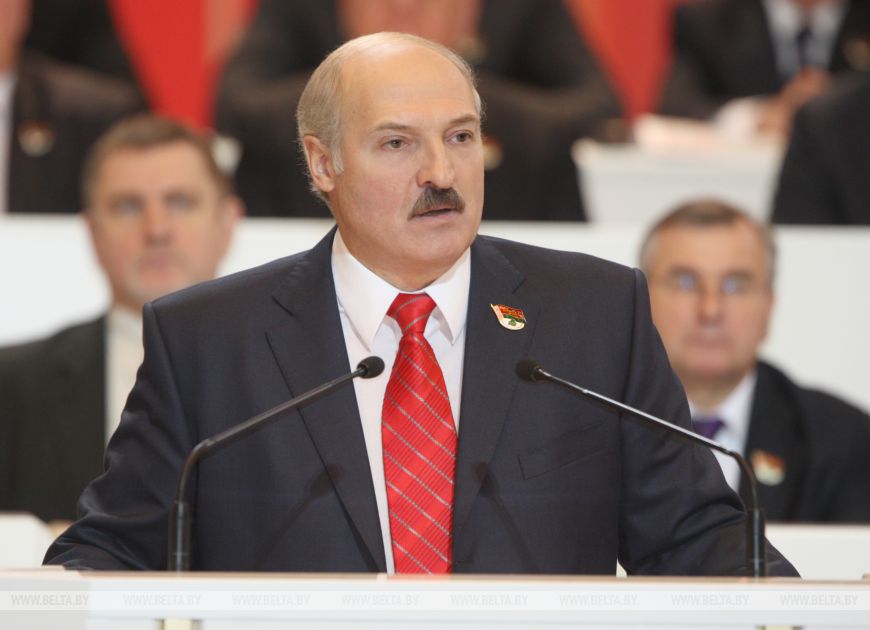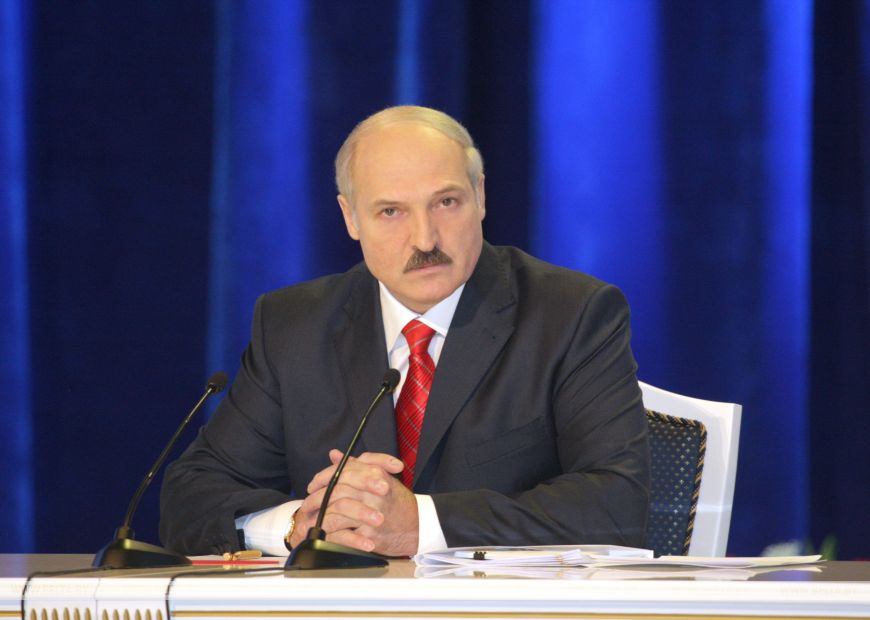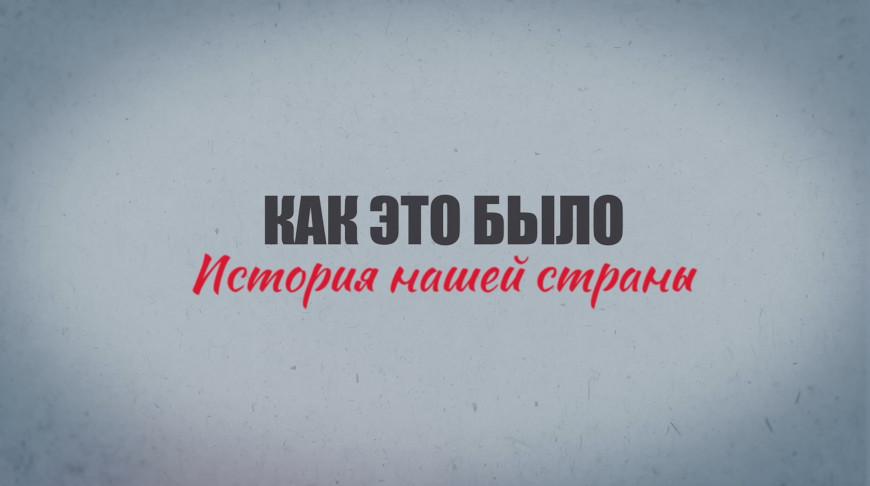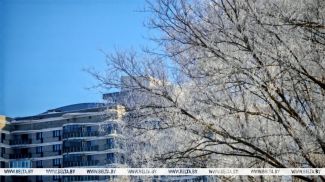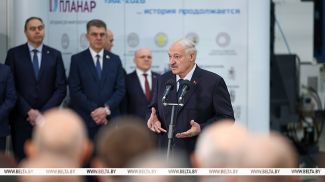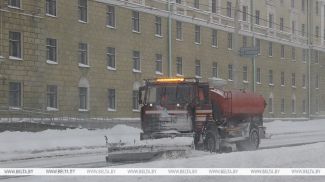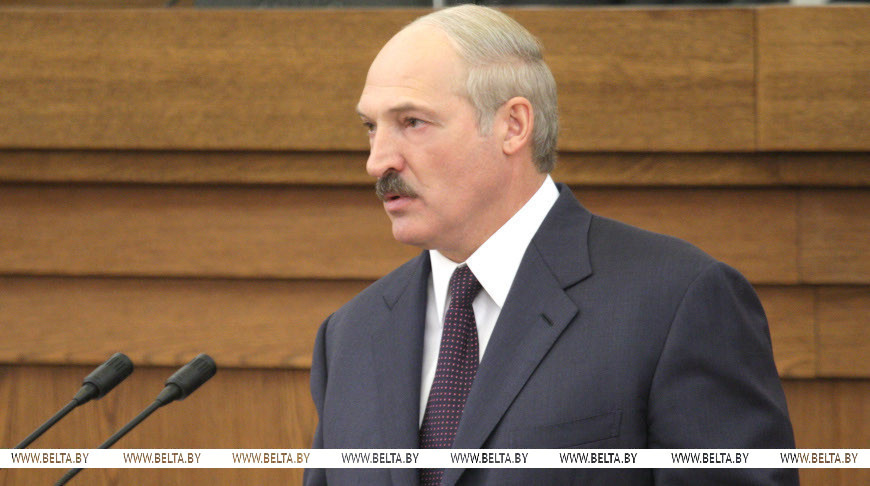
By the way, what does the word “independence” mean in your opinion? Paraphrasing Bismarck, the president once stated: independence is “a luxury not everyone can afford.” This is exactly what we'll discuss. In a new episode of BelTA's YouTube project “How It Was”, we will detail how Belarus built its multi-vector policy, what geopolitical catastrophe the Belarusian leader sought to avoid in 2010, and who tried to put a spoke in the wheels of the young sovereign country. We will also tell you how the Ukrainian president vehemently defended Belarus in Europe, and what trap our country could have fallen into, had it been even a bit less cautious.
So, the year 2010. For the Belarusian head of state, January began not only with the usual sporting and cultural events but also with urgent negotiations with Russian partners.
In late 2009, Belarus and Russia began discussing the terms of oil supply. While they failed to reach a full consensus, the parties managed to work out a temporary solution. However, Russia subsequently effectively reneged on these agreements and put forward the terms that were unacceptable to Belarus. In this context, Aleksandr Lukashenko sent a letter to Russian President Dmitry Medvedev outlining the Belarusian side's position. At the same time, Western media noted that the Russia-Belarus dispute, albeit slightly, had driven up global oil prices.
We will probably never know exactly what Aleksandr Lukashenko wrote to Dmitry Medvedev. But just a couple of weeks later, the Belarusian head of state held talks in Minsk with Turkmenistan leader Gurbanguly Berdimuhamedow and expressed his position on building relationships within the global energy landscape.
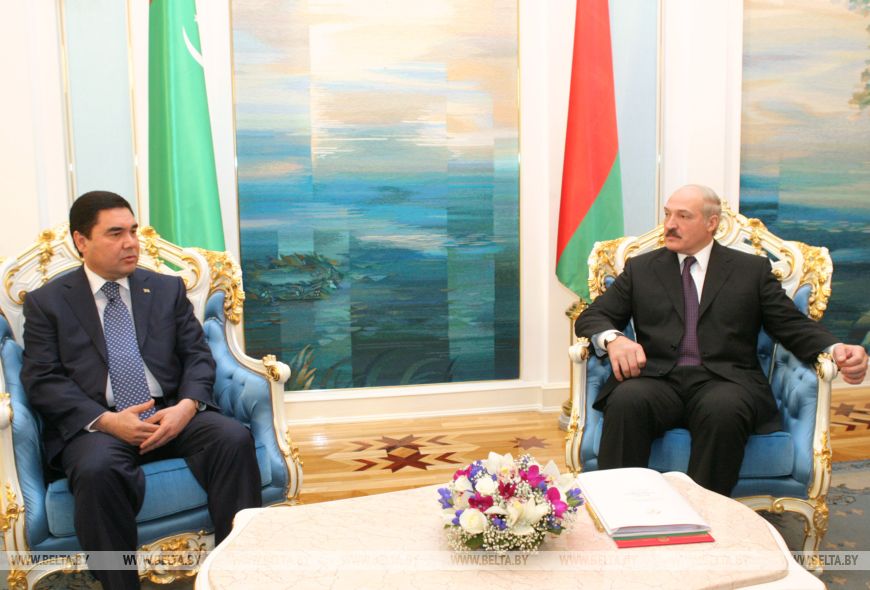
“In Belarus, we proceed from the principle that relationships in the global energy sector must be built taking into account the interests of all participants: exporters, importers, and transit countries,” the Belarusian leader stated unequivocally. “It is important to respect the long-term interests of partners here. The pursuit of momentary gain can undo all the previous painstaking work to develop trusting relationships. I know that my colleague, the president of Turkmenistan, holds absolutely the same viewpoint.”
Why did Lukashenko travel to Venezuela
In the spring, Aleksandr Lukashenko headed on an official visit to Venezuela. The disagreements with the Russian side necessitated the search for new oil suppliers, but that wasn't the only reason. The president had long understood that for an export-oriented country like Belarus, economic stability could only be ensured through the diversification of supplies.At that time, building relationships, whether with South or Latin America, Asia, or Africa, was a matter of survival, national security, and state independence for our country. Even today, no one risks putting all their eggs in one basket.
By 2010, diversification was far from a new concept for Belarus. Russia’s share in Belarus’ exports reduced from 80-85% in the early 1990s to 32% in 2009. Correspondingly, the share of the European Union in Belarusian exports increased from a few percent to 44%. The time had come to increase supplies to geographically distant countries. For example, to Venezuela.
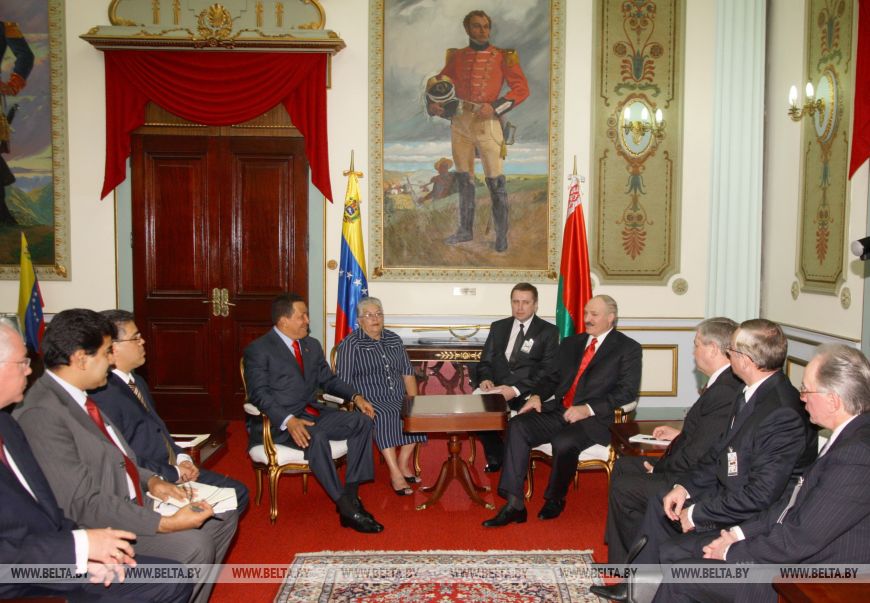
In a short span of time, Minsk and Caracas elevated their relations to a strategic partnership. While mutual trade was a modest $6 million in 2006, it surged to over $230 million in 2009, driven primarily by Belarusian exports. The nations launched joint projects in the social, energy, and military-technical fields. Aleksandr Lukashenko’s second visit to Caracas aimed to strengthen these multifaceted ties, while also exploring new opportunities for energy cooperation.
“I, as president, along with our government and the Belarusian people, are deeply concerned by the events in Venezuela,” stated Aleksandr Lukashenko during talks with president Hugo Chávez. “We view the processes here just as we do those in Belarus. In Venezuela, we have earned the most important thing: the trust of your people and of you personally. We are ready to contribute everything we have to our common cause.”
Despite being on different continents, the two countries have forged a successful partnership based on a shared worldview. They reject pressure and double standards in international politics, and they pursue independent domestic and foreign policies in the interests of their own people, rather than to please transnational corporations or oligarchic clans.
Belarus and Venezuela gradually progressed from simple trade to complex cooperation, confirmed by successful projects in oil production, seismic technology, gasification, architecture and construction, manufacturing, agriculture, science and technology and the defense industry. Unfortunately, for objective reasons, our countries can no longer boast of such breakthrough projects today. But the foundation has been laid, and it is quite possible that a solid structure will be built upon it going forward.
Aleksandr Lukashenko’s visit to Caracas was historic not only for bilateral relations. Thanks to the agreements reached, Venezuela gained its first opportunity to export oil to Europe. A hallmark of Belarusian foreign policy is that Belarusians arrive in any country – Venezuela being no exception – as close friends and brothers, offering not just goods and services, but also new technologies.
Six months later, the two leaders held another round of talks, this time in Belarus, marking president Chávez’s fifth visit to Minsk. He stated that Venezuela had found a brotherly nation and a homeland in the heart of Europe, a sentiment that was warmly reciprocated.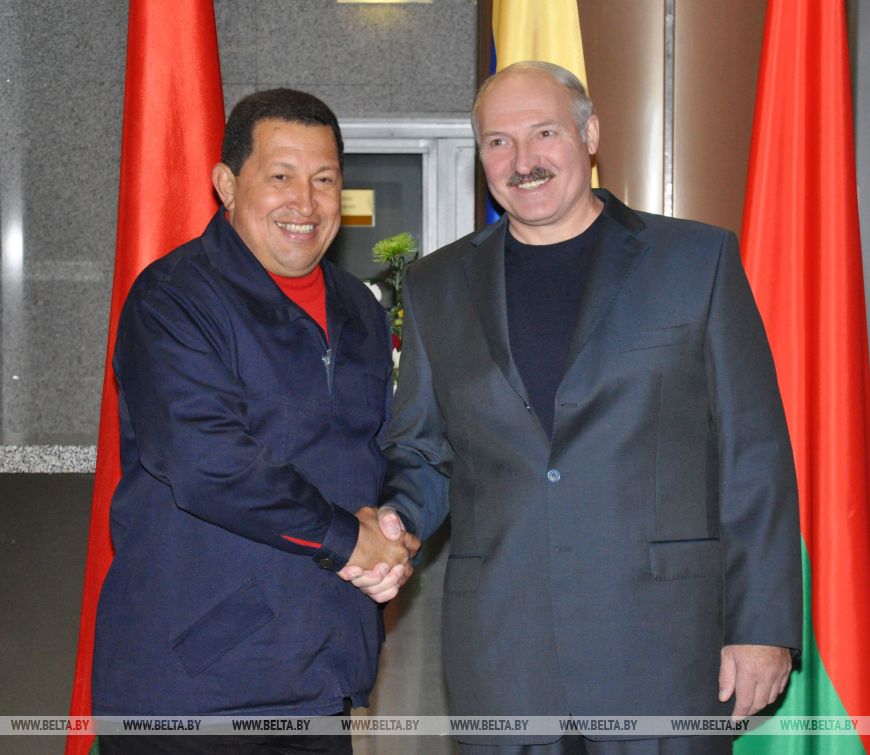 Hugo Chávez and Aleksandr Lukashenko, October 2010
Hugo Chávez and Aleksandr Lukashenko, October 2010
What Belarus agreed on with Brazil
Following his visit to Venezuela in March 2010, Aleksandr Lukashenko traveled to Brazil for the first official visit in the history of their bilateral relations, meeting with president Lula da Silva (who served as head of state from 2003 to 2011 and returned to the post just a couple of years ago).
In a joint declaration following the talks, the presidents reaffirmed their intention to intensify dialogue and bring their nations closer. They agreed that Belarus and Brazil share common views on international law, democracy, human rights, and the pursuit of peace and global security. Lula da Silva welcomed Aleksandr Lukashenko’s decision to open a Belarusian embassy in Brazil and stated that his country would reciprocate by opening an embassy in Minsk.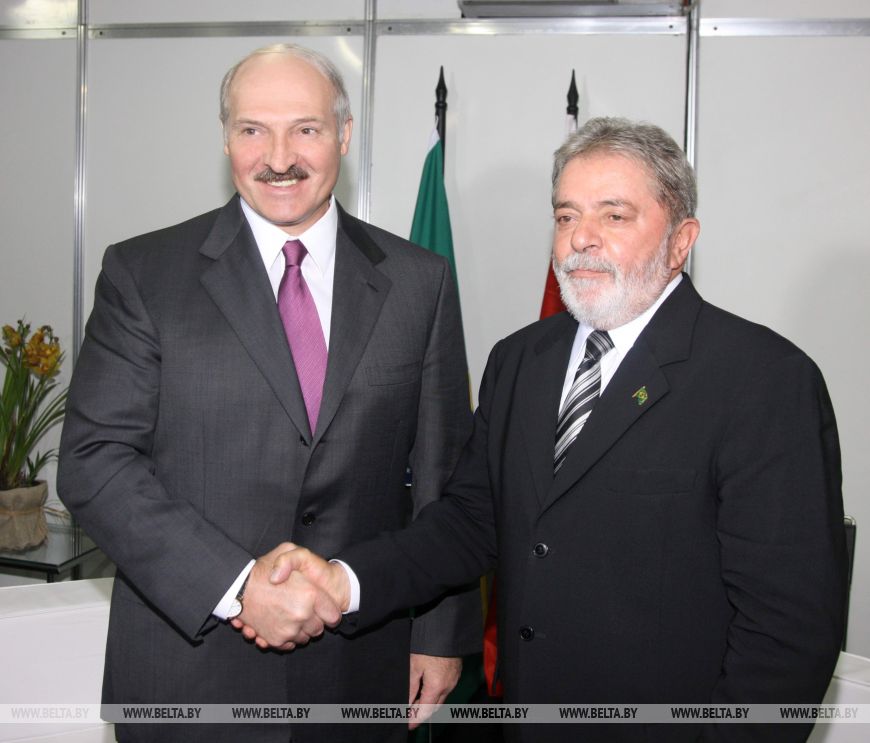 Aleksandr Lukashenko and Luiz Inácio Lula da Silva, March 2010
Aleksandr Lukashenko and Luiz Inácio Lula da Silva, March 2010
The two leaders identified key areas for cooperation, and that meeting helped put Belarus on the map in Brazil. While not all plans were realized, as with Venezuela, the countries have a solid foundation upon which to build and move forward.
The state of Goiás, the heart of Brazil, served as a unique platform for launching cooperation between Belarus and Brazil. A delegation from this Brazilian region had visited Minsk a couple of months before the president's visit. At that time, Aleksandr Lukashenko emphasized that Belarus would like to rely on Brazil's shoulder in South America, as not a single significant issue in the world is resolved without this country's participation. Recalling his visit to Minsk, the governor of the state admitted that the entire delegation was amazed by what they saw in Belarus and pleasantly surprised by the hospitality of the Belarusian people. But the time has come to move on to real deeds.
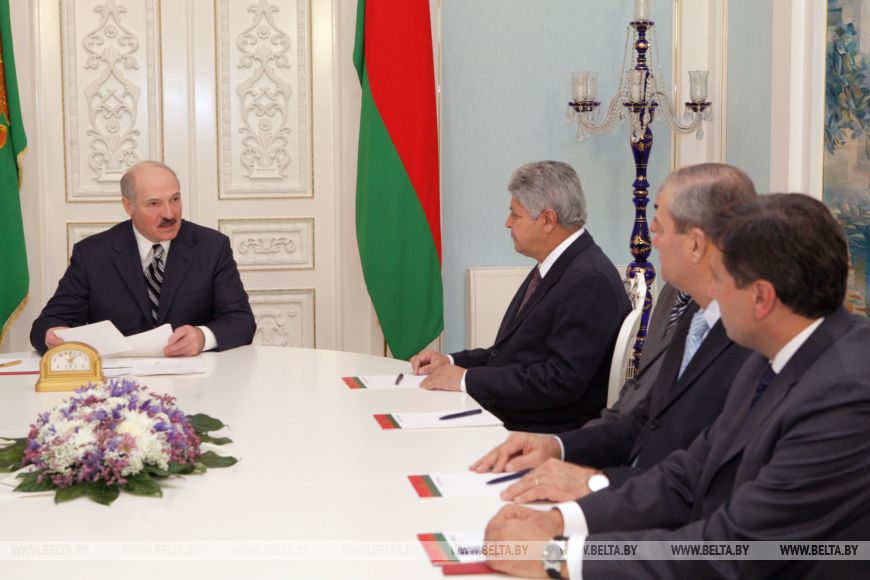
A meeting between Aleksandr Lukashenko and Alcides Rodrigues Filho, Governor of the Brazilian state of Goiás, in February 2010
“Brazil is a giant country by world standards. And of course, we do not expect or plan to establish comprehensive cooperation with the entire country of Brazil. We need to find a foothold, to establish a solid beachhead, so to speak in military terms, from which we can expand our cooperation as far as we are able here. I very much hope that you will help us not only in establishing our relations – between the state of Goiás and Belarus – but you will help us figure out Brazil. You will guide us, to be frank, in cooperating with Brazil. It is very important for us not to make mistakes here. If our relations develop in this way, I want to assure you that we will answer any question put before us. We will solve any problem that we can. And what we are capable of, you already know well,” Aleksandr Lukashenko said during a meeting with the leadership of the Brazilian region.
How Belarus built its relations with China
Where do you think Aleksandr Lukashenko went after his visit to Brazil? Back to Minsk, of course. But it was straight into another round of international negotiations. As the saying goes, from the ship to the ball.
Vice President of the People's Republic of China Xi Jinping has arrived in Belarus. As the Belarusian leader observed, he hadn't merely come to a friendly nation, but almost to his own homeland. And this wasn't said as empty flattery. As you likely know, the Chinese are famously cautious in forging foreign ties, but when they do embrace a partner, it is for the long term.
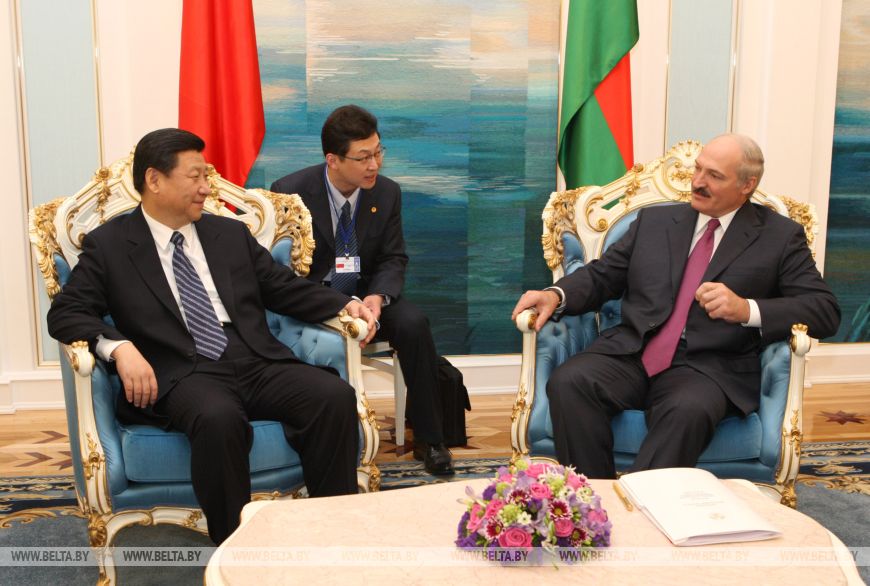 Xi Jinping and Aleksandr Lukashenko, March 2010
Xi Jinping and Aleksandr Lukashenko, March 2010
Belarus and China have indeed taken their time getting to know each other, particularly China, which has thoroughly studied Belarus, including our domestic and foreign policies. The choice was made. While in the early 2000s the countries dreamed of reaching a trade turnover of $500 million, by 2010 that figure had increased several times over. Today, it exceeds $8 billion. Over the past 30 years, Belarus and China have increased their trade by 140 times.
Following Xi Jinping's visit to Minsk and talks between business communities, Belarus and China agreed to sign contracts worth nearly $3.5 billion. Additionally, China decided to provide Belarus with a concessional loan and grant assistance.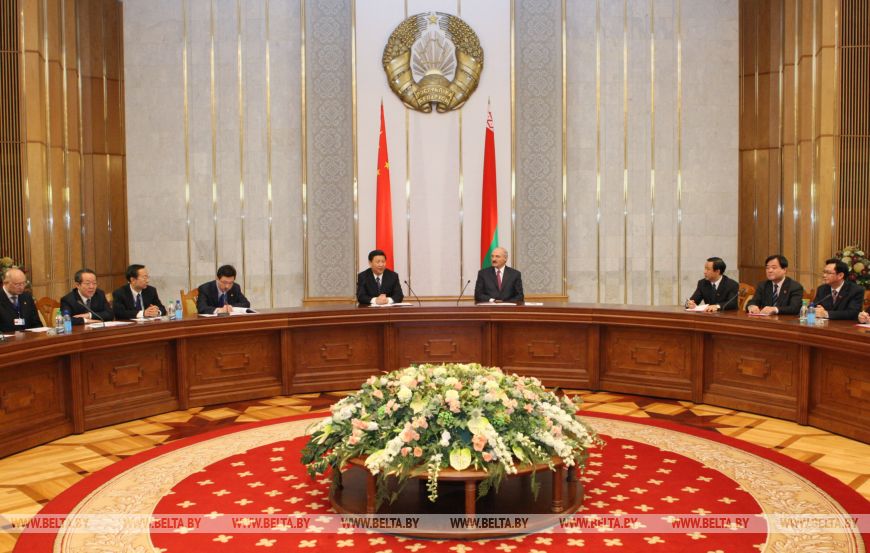 Aleksandr Lukashenko at a meeting with representatives of the business communities of Belarus and China, March 2010
Aleksandr Lukashenko at a meeting with representatives of the business communities of Belarus and China, March 2010
Aleksandr Lukashenko assured his Chinese partners that Belarus is a reliable partner and a stronghold for China on the European continent.
“Despite the global financial and economic crisis, Belarus has managed to maintain political stability, economic growth, and improve the welfare of its population. This indicates that we have made progress in countering the effects of the global crisis. We have always closely monitored your steps in developing the Belarusian economy and highly value the recent successes the country has achieved,” Xi Jinping remarked in turn.
In the autumn, Aleksandr Lukashenko visited China. His trip to Shanghai for Expo 2010 turned into high-level negotiations. In Beijing, the Belarusian head of state met with Chinese President Hu Jintao to discuss the current state and future prospects of cooperation between the two countries, as well as to exchange views on global issues. But the agenda for his visit to China didn’t end there. In the Chinese capital, Aleksandr Lukashenko participated in the opening ceremony of a joint assembly plant for Belarusian dump trucks. The launch of this enterprise marked a milestone in the fruitful cooperation between the two countries. Once, Belarus shared its engineering technologies with China, and now China is reciprocating.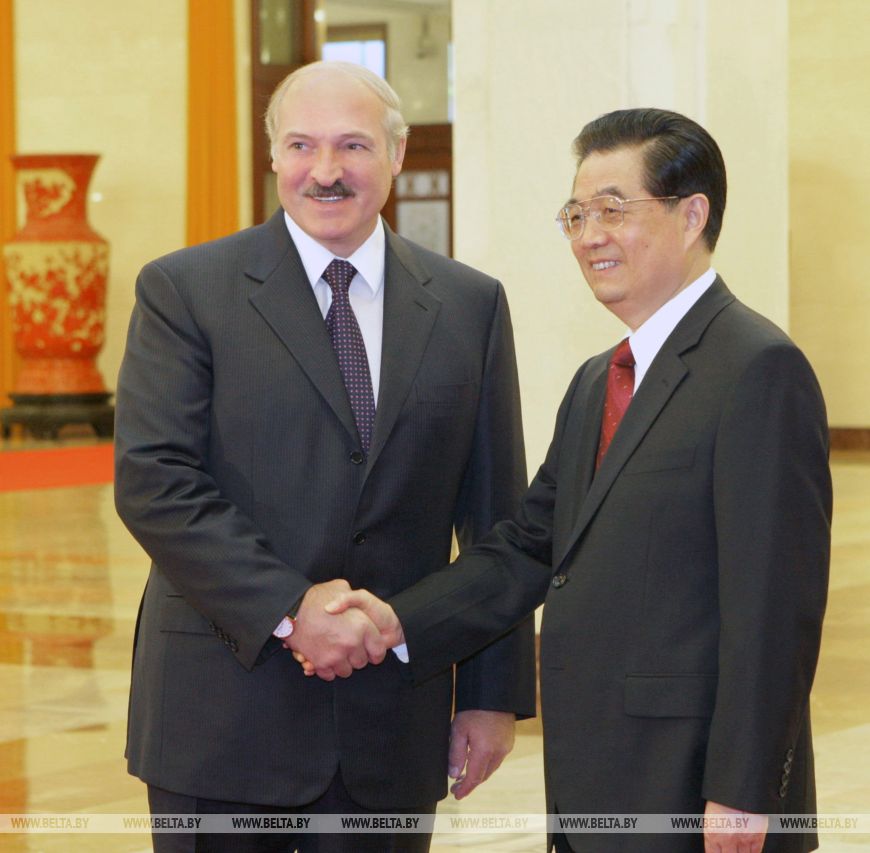 Aleksandr Lukashenko and Hu Jintao, October 2010
Aleksandr Lukashenko and Hu Jintao, October 2010
How did Belarus overcome disagreements with Russia?
What was happening in Belarus-Russia relations at that time? Some were openly trying to put a spoke in the wheel of Minsk. They did not hesitate to use underhanded tactics, spreading absurd rumors that the Russian language was allegedly being discriminated against in Belarus. They seemed to have forgotten that Aleksandr Lukashenko constantly repeated: “The Russian language is our language. Only a fool would reject the Russian language in Belarus.”
But clearly, there were those who very much wanted to artificially escalate the situation. Was there a reason for this? Yes, there was. And the excuse was significant – but more on that later.
“In these murky waters, oligarchic groups are unashamedly trying to grab a share of our economy. In fact, they are the ones who stirred up this petty squabble. At times, Russia’s leadership behaves as though we have no alternative. But we do. A country at the heart of Europe will never be left without partners. But Belarus will not kowtow to anyone! This is not arrogance. I can't allow myself to humiliate my people! No matter how lofty it may seem, I am the president of a country elected by ten million people, and no one has the right to bend me. Because when a president crawls on his knees before others, it is the people who are made to suffer,” the head of state stressed in his address to the Belarusian people and parliament.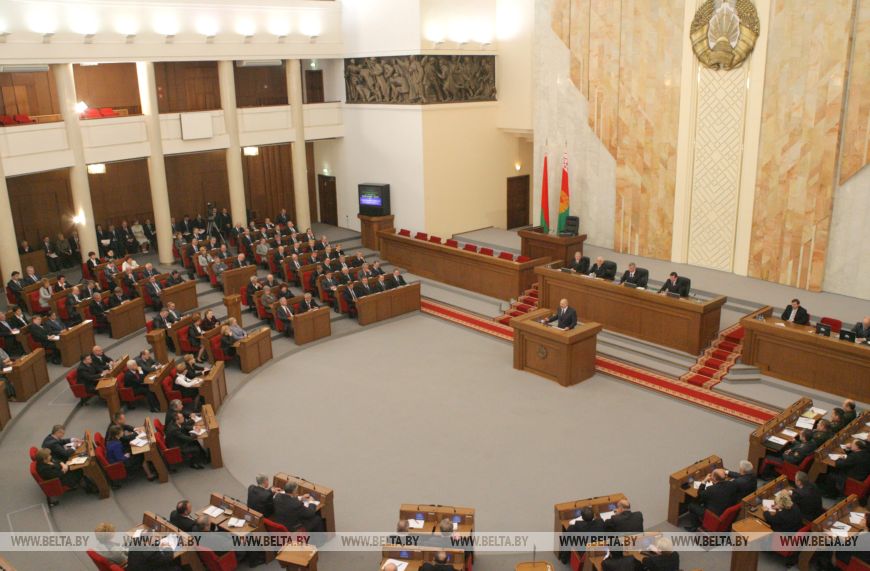 Aleksandr Lukashenko during his address to the Belarusian people and the National Assembly of Belarus, April 2010
Aleksandr Lukashenko during his address to the Belarusian people and the National Assembly of Belarus, April 2010
Aleksandr Lukashenko stated that he does not seek any confrontation with Russia and, moreover, maintains constant contact with its leadership.
“But there are some who remain dissatisfied, even when the president [of Russia] and I reach agreements, that is not normal and it must be overcome. I say this openly to my people, and it will also be heard in Russia. Just don’t delegate to certain “Suzdal‑types” or others to throw mud at the president. We know who gives those orders and where they come from, and we will respond firmly. Let’s return to normal cooperation! No one today will be allowed to dictate to anyone. We must work as partners, as brothers. In negotiations I even say: we accept that Russia is our elder brother, but an elder brother who will never allow the younger one to be wronged,” the Belarusian leader said.
And where was the president wrong?
What policy did the European Union pursue towards Belarus?
Against the backdrop of disagreements with Russia, which escalated over time into a “gas war”, Western countries, and not only neighboring ones, began to visit Minsk more frequently, whether it was a coincidence or not.
Whatever the reasons behind these visits were, Belarus sincerely seeks friendly and mutually beneficial relations with all its partners, advocating balanced ties with both East and West. There was only one condition, which Aleksandr Lukashenko always openly stated: respect for the Belarusian people and a willingness to work without hidden agendas or pressure, in a sincere, honest, and transparent manner.
“I want you to understand that we will not collapse, we will not crawl on our knees before anyone: neither before you [the EU], nor before Russia, nor before the US. Double standards in relations must be abandoned; instead, we should focus on the key issues of mutual benefit: our sovereignty, our security, and the independence of Belarus. And to preserve that independence, we will do everything necessary. We will not run around Europe, the United States, or Russia begging for money, nor will we play to Russia’s tune, as our so-called opposition does, which is so admired by some politicians in Europe. We will not do that,” Aleksandr Lukashenko said at a meeting with EU Commissioner for Enlargement and European Neighborhood Policy Štefan Füle.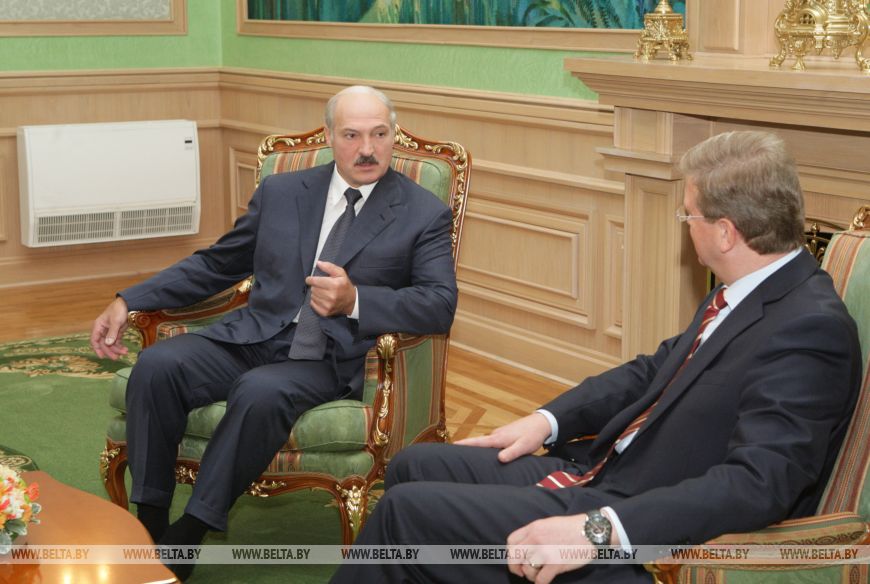 Aleksandr Lukashenko and Štefan Füle, July 2010
Aleksandr Lukashenko and Štefan Füle, July 2010
The European politician, in turn, proposed identifying the problematic issues in Belarus-EU relations: “It is not in the EU’s interest for Belarus to be seen as an isolated entity. We are interested in Belarus being a full member of the European community. We also want you to make use of your most valuable asset: not cheap gas or oil, but your citizens, the people of this beautiful country.”
In the same year, Lithuanian President Dalia Grybauskaitė visited Minsk. She stated that her country was interested in improving and intensifying relations with Belarus.
“Lithuania is interested in economic cooperation and in our joint energy projects. We are also trying to help ensure that the European Union’s policy towards Belarus is implemented as actively and openly as possible. In this regard, Lithuania is ready to cooperate and to defend Belarus’ interests to the extent that Belarus itself wishes,” Dalia Grybauskaitė said.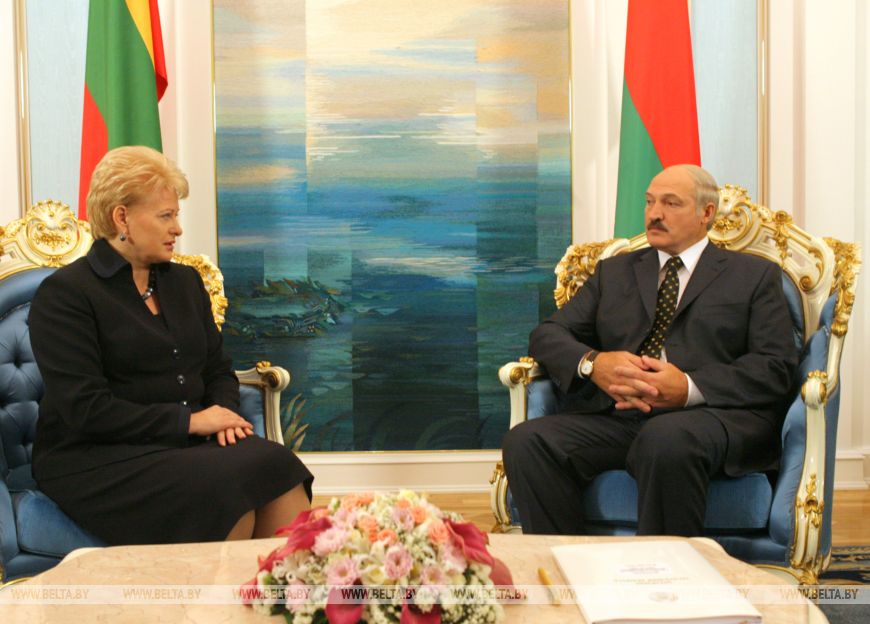 Dalia Grybauskaitė and Aleksandr Lukashenko, October 2010
Dalia Grybauskaitė and Aleksandr Lukashenko, October 2010
Ahead of visits by Western partners, the Belarusian president also began to receive growing attention from Western media. Journalists seemed to be carefully testing the waters: “Perhaps it is time for Belarus to turn 180 degrees and embark on the path towards European integration?”
However, they could not get Aleksandr Lukashenko to take the bait. The head of state emphasized that big politics does not tolerate abrupt turns. Besides, Belarus was not really welcome in Europe. Yet journalists insisted: “Belarus is a European country, after all…” The president remained firm, stating that he could not pursue a policy in the interests of any groups or clans – only in the interests of the Belarusian people.
As a side note, there is an interesting fact. Meeting with students and teachers of Mogilev universities in May, the head of state made a noteworthy statement. Earlier that year, presidential election had taken place in Ukraine. Commenting on relations between Minsk and Kiev, Aleksandr Lukashenko admitted that during Viktor Yushchenko’s presidency the two countries faced many challenges. Moreover, the president said that the Ukrainian politician had done more for Belarus than any other foreign leader. Aleksandr Lukashenko, May 2010
Aleksandr Lukashenko, May 2010
“He vigorously defended Belarus in Europe and the USA fighting passionately for its interests. I have always been grateful to him for that. He never demanded that we take an anti-Russian position. We shared common views, common ground, and we tried to use this to advance our relations,” Aleksandr Lukashenko said.
And what about Europe itself? During meetings with the Belarusian head of state, representatives of EU countries expressed their support. But in practice, things were different: no one was eager to embrace Belarus that had its own opinion and position and refused to bend. However, using such a country for one’s own purposes… Why not? In return, European officials hinted, Belarus could expect a pleasant bonus of billions of euros in assistance.
“Poland supports the goals and objectives of the Eastern Partnership, namely economic integration, visa facilitation, and cooperation that will help bring countries closer together. Moldova, which also participates in the Eastern Partnership and is a much smaller country than Belarus, will soon begin to receive about two billion euros in assistance. I believe political opportunities will be created for Belarus to benefit from this cooperation,” Polish Minister of Foreign Affairs Radosław Sikorski said during a meeting with Aleksandr Lukashenko.
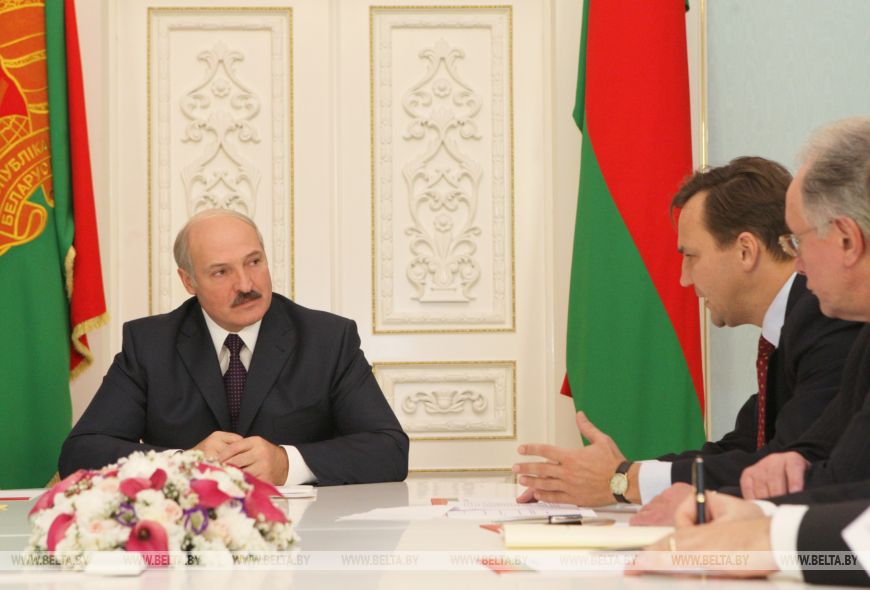 Aleksandr Lukashenko and Polish Minister of Foreign Affairs Radosław Sikorski, November 2010
Aleksandr Lukashenko and Polish Minister of Foreign Affairs Radosław Sikorski, November 2010
What Aleksandr Lukashenko called the highest national value of Belarusians
What lay behind all these political twists and turns? Why was there so much pressure on Belarus, why were attempts made to lure it into their political web? The answer seems clear: the country was preparing for a presidential election at the end of the year. And Belarus capable of pursuing an independent policy, despite lacking, as many believe, modern foundation for it, such as energy resources, was clearly a thorn in someone’s side.
Speaking at the 4th Belarusian People’s Congress just a couple of weeks before the election, Aleksandr Lukashenko noted that independence is not merely a formal declaration or external symbols such as a flag, coat of arms, anthem, or currency. It is the right of the people to independently choose the strategy for social, economic, political, and cultural development, to defend national interests, and to ensure the growth of living standards.
Belarus did not give in despite incredible pressure and massive blackmail from all sides. Belarusians did not allow the political and social stability they had created to be destroyed. They preserved their national heritage, which in other countries was sold off for a pittance. And isn’t that a reason to be proud?
